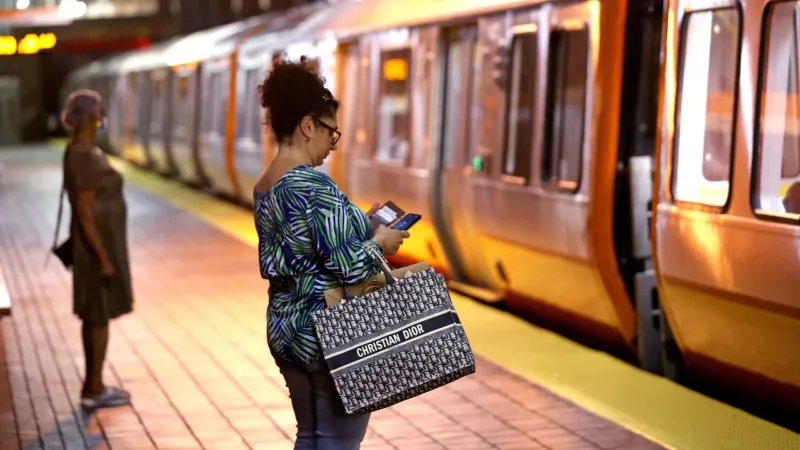In a suspicious world, many of us are reluctant to interact with strangers. But talking to people we've never met before, even in passing interactions, can make us wiser and happier. L Like many people who grew up in America in the 1980s, I was raised to fear strangers. "Stranger Danger" was all the rage in those days. Parental concern and humanity's natural wariness towards strangers were supercharged by sensationalist media coverage and plummeting levels of social trust, which bloomed into a full-on moral panic.
Police officers, teachers, parents, religious leaders, politicians, media personalities, and child welfare organizations set aside their differences and worked together to spread the message – that interacting with a stranger could be putting them at risk. While there is no doubt that some people do have traumatic experiences with strangers, "stranger danger" lacked any real statistical basis. Then, as now, the majority of sexual and violent crimes against children (and adults, for that matter) are committed by people known to the victim: relatives, neighbors and family friends. Abductions by non-family members – which include those where a child is taken by someone unknown to them – account for just 1% of the missing children cases reported to the National Center for Missing and Exploited Children in the US. But, it felt real, and therefore it was real. Stranger rhymed with danger, and the pair became inextricably linked. Could this way of thinking, however, have affected our interactions in later life for many of us? Have we missed out on something valuable?
Some social scientists believe teaching kids that literally everyone in the world they hadn't met is dangerous may have been actively harmful. The political scientist Dietlind Stolle, from McGill University in Canada, argued that decades of this messaging may have damaged a whole generation's ability to trust other people. This is problematic – trust being key to the functioning of many societies. "How many social or economic opportunities do we miss by simply being afraid of strangers?" Stolle wondered.
While I am not advocating for strangers to approach children, or vice versa, I do believe, as adults, we should think again about the benefits of safely speaking to strangers. For several years, I researched why we don't talk to strangers and what happens when we do for my book, The Power of Strangers: The Benefits of Connecting in a Suspicious World. This effort put me in the company of anthropologists, psychologists, sociologists, political scientists, archeologists, urban designers, activists, philosophers, and theologians, plus hundreds of random strangers I talked to wherever I went.
What I learned was this: we miss a lot by being afraid of strangers. Talking to strangers – under the right conditions – is good for us, good for our neighborhoods, our towns and cities, our nations, and our world. Talking to strangers can teach you things, deepen you, make you a better citizen, a better thinker, and a better person. It's a good way to live. But it's more than that. In a rapidly changing, infinitely complex, furiously polarized world, it's a way to survive.
For more than 6,000 years, humans have lived in cities – a form of social organization characterized by a superabundance of strangers. But only recently have psychologists begun studying what happens when we talk to all these faceless strangers we're surrounded by every day.
In 2013, psychologists Gillian Sandstrom, at the University of Sussex in the UK and Elizabeth Dunn at the University of British Columbia, published the result of an experiment, in which they had 30 adults smile and talk to their barista at a coffee shop in Toronto, and 30 more make their transaction as efficient as possible. "People are remarkably pessimistic about almost every aspect of talking to strangers," Sandstrom wrote, but that pessimism appears to be unwarranted. The study participants who interacted when buying their coffee reported feeling a stronger sense of belonging and an improved mood than those who didn't talk to stranger. The authors concluded, "the next time you need a little pick-me-up, you might consider interacting with the Starbucks barista… thereby mining this readily available source of happiness".
Plucking up the courage to strike a conversation with a stranger might feel tricky, considering it's not normally the done thing for many of us. Behavioral scientists Nicholas Epley and Juliana Schroeder at the University of Chicago asked commuters to talk to strangers on mass transit, in taxis, and in waiting rooms – places where the social norm in Chicago is against talking. Understandably, most participants predicted these interactions would go poorly. Wary of violating a social norm, they worried the stranger would resent the intrusion and reject them, and their commutes would be even more unpleasant than they already were.
Humans may be social animals but may not always be social enough for their own well-being – Nicholas Epley and Juliana Schroeder
When the participants went out and actually engaged with people, however, they found the strangers were surprisingly receptive, curious and pleasant. "Commuters appeared to think that talking to a stranger posed a meaningful risk of social rejection," Epley and Schroeder wrote. "As far as we can tell, it posed no risk at all."
On the contrary, the participants who talked to strangers reported the conversations were enjoyable, interesting and lasted longer than they had predicted, and made their commutes more enjoyable. Epley and Schroeder add that this suggests a "profound misunderstanding of social interactions", concluding "humans may be social animals but may not always be social enough for their own well-being".
Lest these results be chalked up to Midwestern American friendliness, Epley and Schroeder conducted the same experiment in a less historically friendly locale, and had commuters chat with strangers on mass transit in London – a prospect many Londoners regard with a mix of scorn and horror (and a place where even eye contact is usually avoided). Yet Epley and Schroeder saw the same results. The conversations went remarkably well.
Since then the result has been repeated in other countries involving a diversity of participants. The findings of these studies have been remarkably consistent: many people dread talking to strangers, but when they do, they tend to come away feeling good: happier, less lonely, more optimistic, more empathetic, and with a stronger sense of belonging to their communities. Several experts, as well as members of the public who talk to strangers, told me that doing it actually makes them feel safer, providing ready affirmation that the people around them are well-meaning.
Still, there are many reasons why people feel uncomfortable talking to strangers. People report being worried about violating a social norm, fearing that they will be bad at talking or won't have anything to say, or being anxious about talking to someone from another group and being attacked or saying the wrong thing.
Many factors conspire to keep us from talking to one another. Certainly, smartphones have made it easier than ever to avoid interacting with the people in our immediate environment. And we might be naturally wary about approaching someone who looks untrustworthy to us, even if we have never met them. We prefer to cooperate with someone who looks similar to someone who we have trusted in the past rather than someone who looks like an untrustworthy former acquaintance.
So it comes as little surprise that when those fears fail to bear out, people are relieved. I felt it myself when I had positive interactions with strangers. "I think that relief might just be the feeling that we're sold this message that the world is a scary place," says Sandstrom. "And then you have a chat with some random person, and it goes well, and it's like, 'Maybe the world isn't so bad after all'."
This is no small thing. At a time when so many people feel lonely, estranged, excluded, disconnected, pessimistic, these findings are both useful and reassuring. Interacting with strangers, even in passing, can help us build or rebuild social networks, reconnect us with our communities, and shore up trust in the people around us. As a university student who participated in one of Sandstrom's more recent experiments reported: "I felt like I had forgotten how to make friends, but this study reminded me that most people are friendly, and you just need to put yourself out there."
As a straight white guy, I recognized from the outset that my interactions with strangers can be less fraught than they are for people who aren't straight white guys. So, while researching my book, I made sure to talk to a wide diversity of people who had made a practice of talking to strangers. Despite their varied backgrounds and experiences, they mostly report the same positive effects as can be found in the research literature. But I wouldn't presume to suggest that these interactions are the same for anyone, and in no way do I dismiss the concerns of people who have had traumatic experiences with strangers. Additionally, I strongly suggest men in my position be mindful of this when chatting with strangers themselves.
Sandstrom gives some more advice for talking to someone you don't know; ask an open question to get them to talk first, and then reply with something you have in common – there's a reason we default to talking about the weather.
But if you can, it is worth trying. Talking to strangers can affect you in deeper ways than you might expect and bring about many health benefits.




